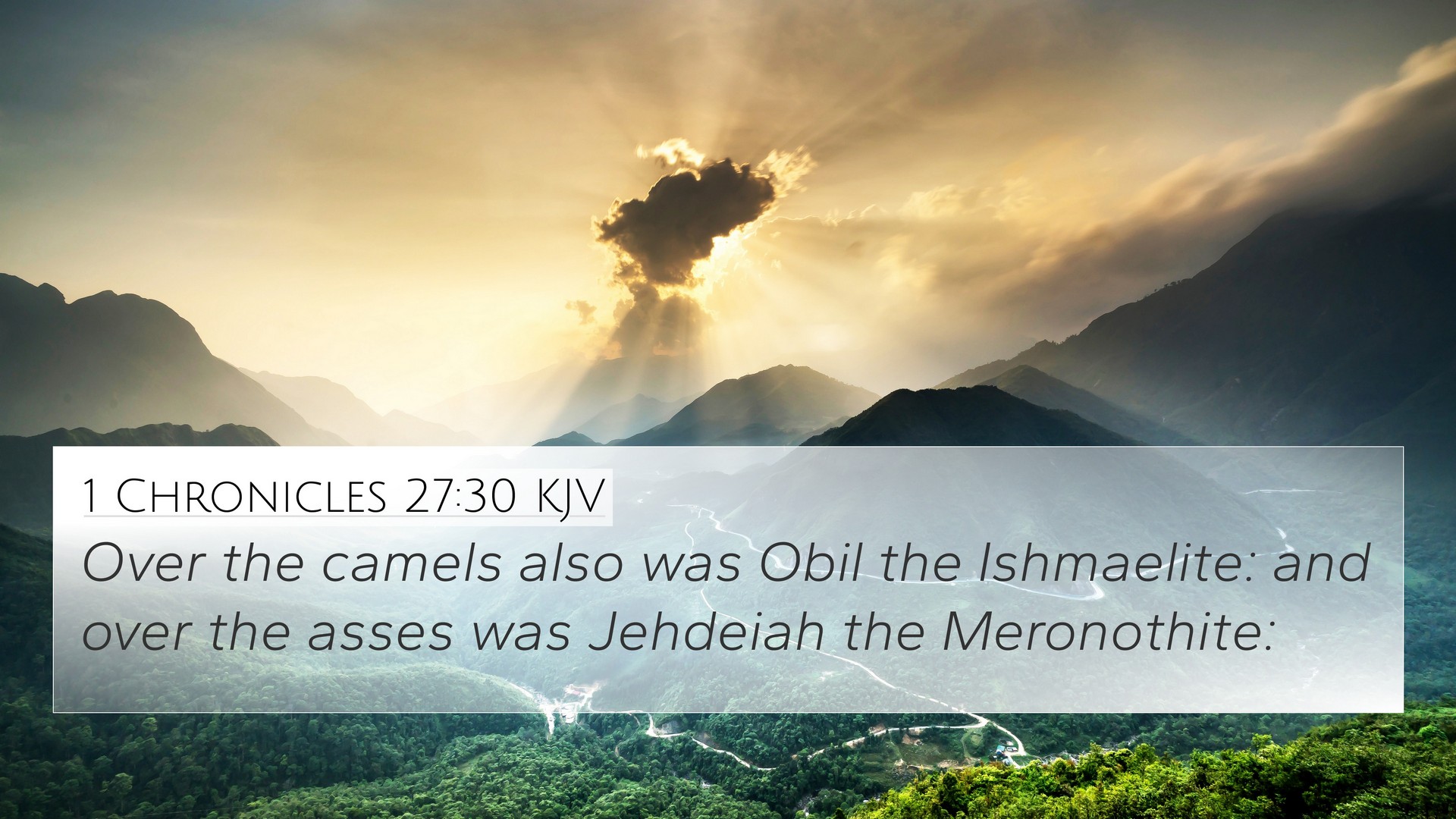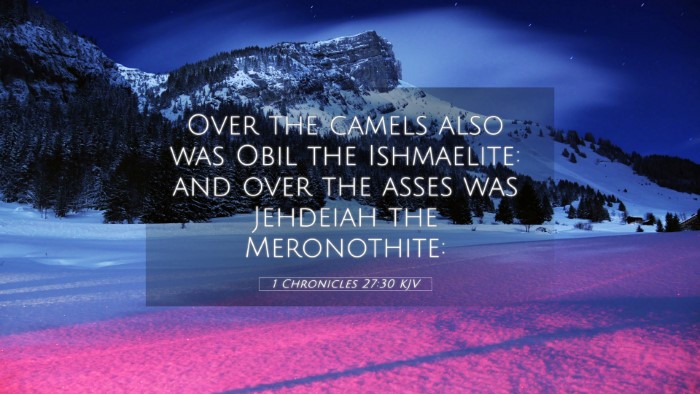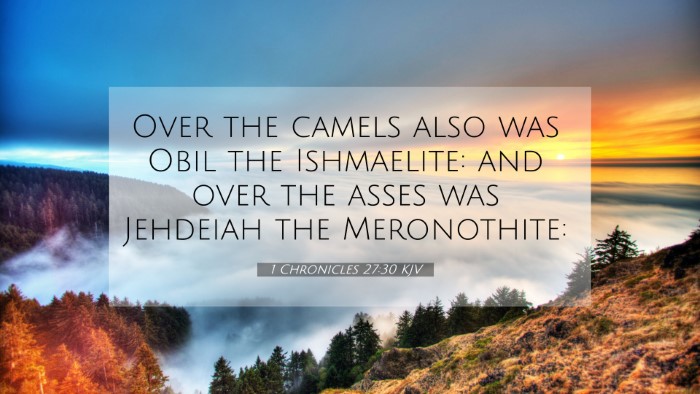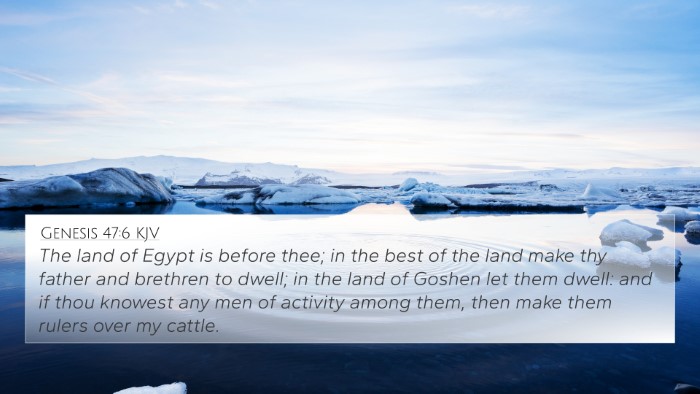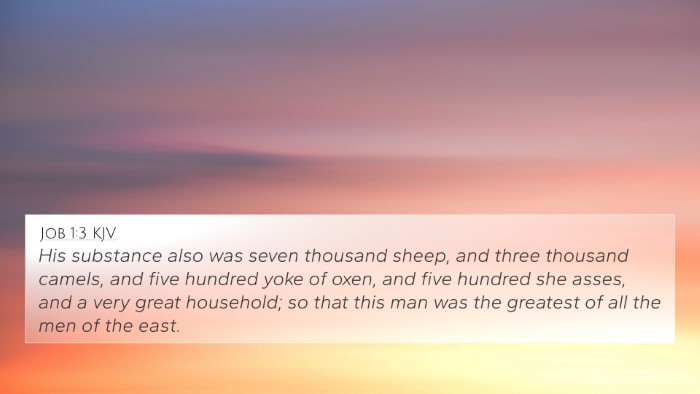Understanding 1 Chronicles 27:30
The verse 1 Chronicles 27:30 states: "Over the herds that fed in Sharon was Shitrai the Sharonite: and over the herds that were in the valleys was Shaphat the son of Adlai."
This verse highlights a part of King David's administration, where he appointed specific leaders over various agricultural and livestock operations. It demonstrates the organization and structure within David's kingdom, indicating a wise management of resources and personnel.
Meaning and Interpretation
The verses surrounding 1 Chronicles 27:30 illustrate the importance of appointments in leadership. Different territories and responsibilities are noted, showcasing the diverse aspects of governance and management during David's reign. The references to specific individuals serve to highlight their roles and contributions to the kingdom.
Commentary Insights
Matthew Henry's Commentary
Matthew Henry emphasizes the orderly arrangement of David's kingdom. He notes that the verse signifies the great concern David had for the welfare of his kingdom and the meticulous planning he undertook to ensure effective governance. Each appointed individual had a specific role, reflecting the importance of diligent oversight in leadership.
Albert Barnes' Notes
Albert Barnes points out that the mention of particular names lends credibility and historical context to the narrative. He suggests that these leaders were chosen based on their capabilities and that their roles were crucial for the sustenance of the kingdom. The emphasis on pastoral care for livestock implies an understanding of agriculture as vital for the nation’s economy.
Adam Clarke's Commentary
Adam Clarke speaks about the geographical significance of Sharon in relation to the herds. He notes that this fertile region was known for its richness and abundance, which is essential for the prosperity under David's rule. Clarke underscores that these appointments also reflect a system of accountability, where each leader was responsible for a particular domain.
Cross-References and Thematic Connections
This scripture connects with various other Bible verses, forming a network of thematic significance. Here are some pertinent cross-references:
- 1 Chronicles 25:7: Discusses the division of responsibilities among the Levitical musicians, emphasizing organized service.
- 1 Samuel 10:1: Highlights the anointing of Saul, establishing the importance of leadership in Israel.
- 2 Samuel 8:2: Details David’s military successes, showing his governance extended beyond pastoral care.
- 1 Kings 4:27: Describes the provision under Solomon's reign, connecting agricultural management with royal oversight.
- Psalms 23:1: Speaks metaphorically to shepherding, which relates to David as both king and shepherd of Israel.
- Isaiah 40:11: Portrays God as a shepherd caring for His flock, paralleling the human leaders’ responsibilities.
- Ezekiel 34:11-16: God's indictment of bad shepherds, contrasting with David's organized leadership.
The Role of Leadership in Scripture
The leadership demonstrated in 1 Chronicles 27:30 resonates throughout the Bible, reinforcing the notion that effective governance is vital for community welfare. The structure and roles given to individuals align with broader theological themes found in both the Old and New Testaments.
Further Insights into Cross-Referencing
Understanding 1 Chronicles 27:30 through cross-references enhances its meaning and illustrates the interconnectedness of biblical narratives. Engaging in comparative Bible verse analysis aids in recognizing these ties, and using tools for Bible cross-referencing can deepen one’s study significantly.
For those seeking to explore more about linking Bible scriptures, employing a Bible concordance or a Bible cross-reference guide can uncover additional relationships between verses. This holistic approach to Bible study showcases how historical contexts, administrative details, and divinely appointed leadership converge in biblical texts.
Conclusion
In conclusion, 1 Chronicles 27:30 serves as an example of the complexities of leadership in biblical times and the importance of organized governance. Through this verse and its surrounding context, we find valuable lessons that extend beyond ancient history, promoting the necessity of stewardship, responsibility, and divine order in leadership roles.
By examining the cross-references and drawing connections, readers can appreciate the intricate tapestry of themes that the Bible presents regarding authority and management, leading to a greater understanding of scripture as a whole.
